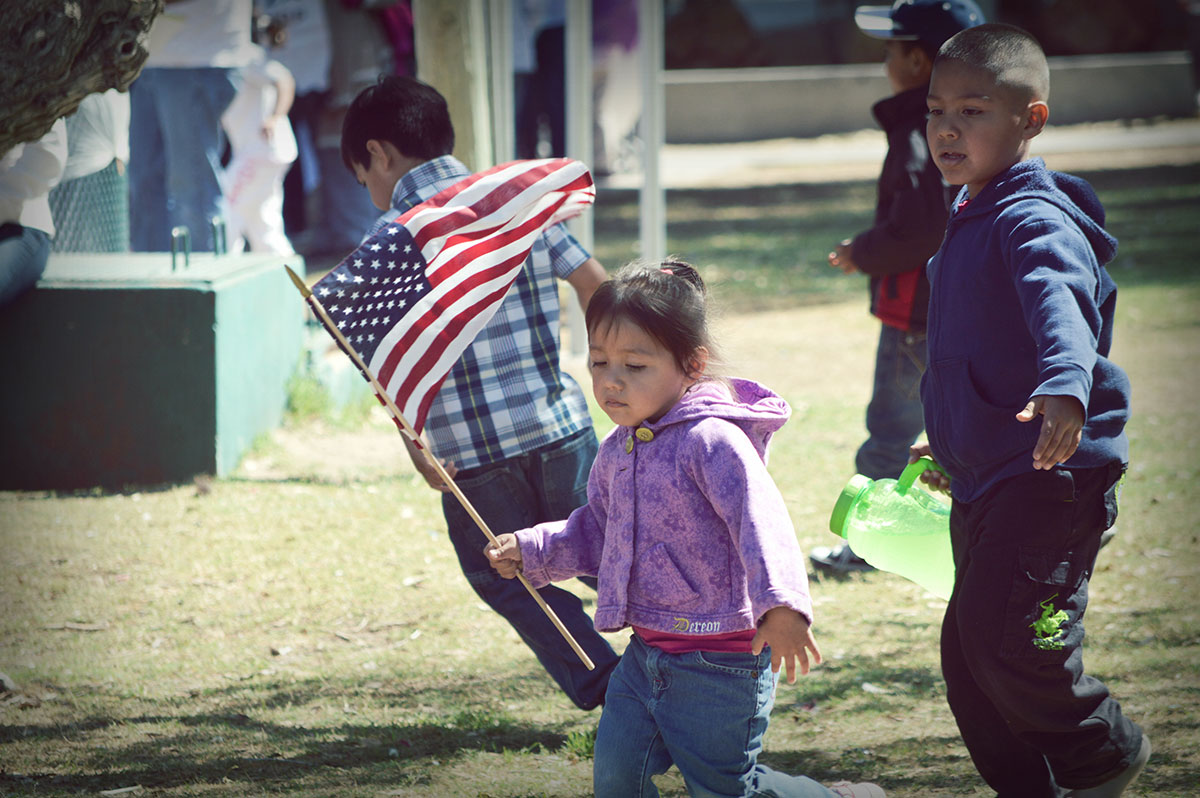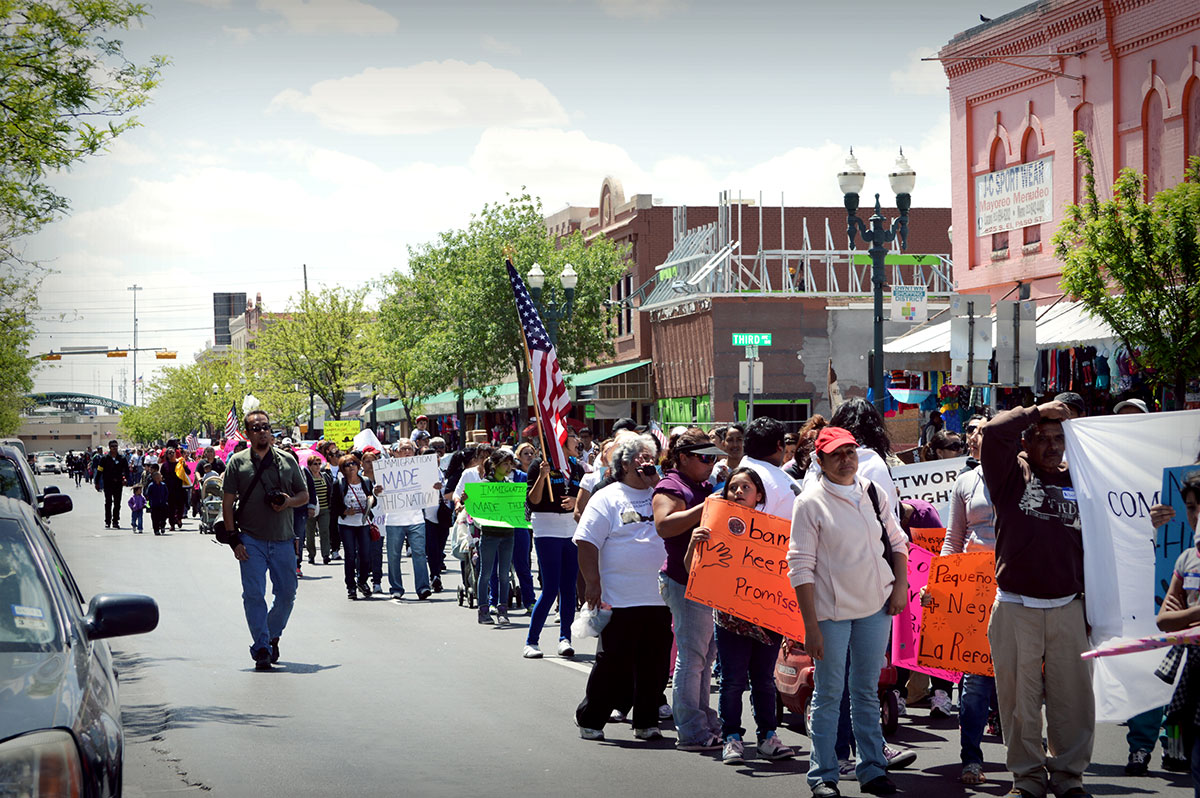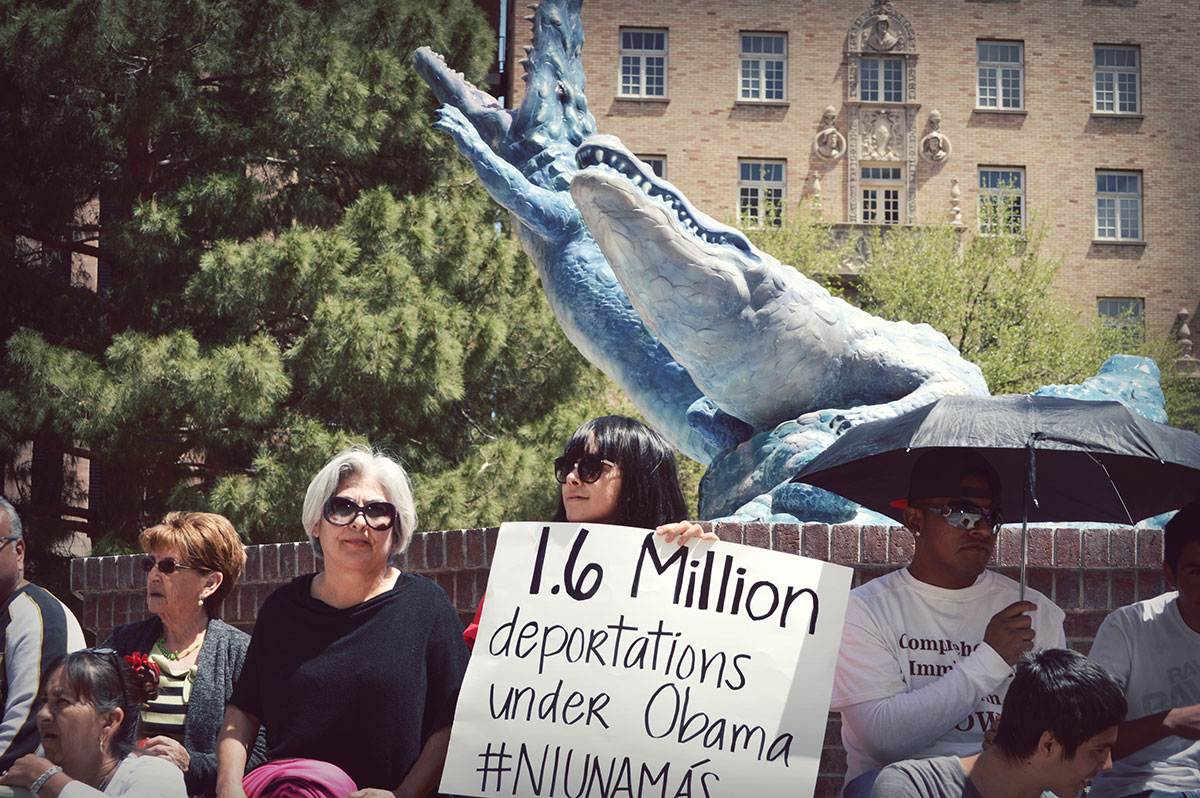EL PASO – Downtown vendors stood motionless at the doorways of their stores and shoppers stopped in their tracks on an early afternoon in April. Only the faint protest of marchers could be heard heading up El Paso street, but with each step closer their voices became strong and loud.
“Sí se puede. Yes we can!” they shouted, “Obama, escucha, estamos en la lucha (Listen Obama, we are in a struggle).”

The separation of families is one of the consequences of the current immigration system. (Natassia Bonyanpour/Borderzine.com)
BNHR, based in El Paso, is a human rights advocacy organization that is primarily active in immigration and border policy. The group which represents 700 families, helped organize this event, in addition to several others around the city. This assembly echoed the streets of Washington D.C, where thousands of activists also gathered in faith of improving Immigration.
Similar marches and rallies are expected to occur in the nation’s capital and in other parts of the country as the legislation winds its way through the U.S. Senate and House. Different states are taking up the immigration reforms in their way – one is State of Maryland just decided to provide driver’s licenses to undocumented immigrants.
At the El Paso event, the mile march from Armijo Park to San Jacinto Plaza demonstrated the resilient voices of El Pasoans and New Mexicans in the very heart of downtown. Many held vivid, hand written bilingual signs illustrating hope for reform. American flags, which waved in the slight breeze, rose high above the crowd of 1,000, serving as a symbol of Mexican-American unity.
“I’m the daughter of immigrants,” said Cristina Parker, Communications Director of Border Network for Human Rights (BNHR). “A lot of families are mixed status. Some people are citizens, some people naturalized and some are undocumented. That is the case for about 16 million families.”
“We need a system where people can come work and contribute to society, that is all they want,” Parker said. “One of our goals is to get our message across to Senators Ted Cruz and John Cornyn that they need to get behind Immigration Reform.”
Newly elected United States Senator for the state of Texas Senator Cruz has already been making headlines with views that go against the grain in Washington. Cruz, whose father is from Cuba, is against current proposals to restructure immigration ideas. According to CNN, bipartisan senators, dubbed the “Gang of Eight,” have presented a new a bill to create a 10-year path toward green card status and another three for citizenship for the 11.1 million undocumented workers currently residing in the United States. The proposal also says undocumented workers must pay fines and back taxes. Cruz calls the bill immensely “divisive” because the U.S. House and Senate will not be able to agree on these provisions.

About a thousand people attended the rally organized by the Border Network for Human Rights (Natassia Bonyanpour/Borderzine.com)
Cornyn also believes the “Gang of Eight” bill will not pass. Nonetheless, he still advocates tighter border security policy and stricter visa regulations.
“We need a safe, secure but free and prosperous border,” said Parker. “So we’re here to tell them that is what matters to Texas…that is what matters here at the border, they need to be behind us, not against us.”
With just a thin river dividing El Paso from Ciudad Juarez, the area is particularly affected by immigration and deportation issues. One significant concern of current immigration policy is the lengthy and costly obstacles to residency and citizenship that leave many of those applying disenchanted with the process.
“For me it has been extremely difficult since my hubby was deported,” El Paso born Rocio Chavez said. “Now that we started the process, every lawyer (I went to nine so far) asked me for paperwork to get started and we didn’t have it. I went and requested it and took four months to get it in the mail.”
Chavez, 32, described how her husband, who was born in Juarez, applied for citizenship multiple years ago, and doesn’t have the money to finish the process.
“The lawyers are expensive, the cheapest one I found was $7,000,” Chavez said. “Now I have to [file an immigration] petition but we have no money because I’m the main provider. He doesn’t have a steady job [in Juarez].”
Although she has lived in El Paso her entire life, Chavez recently moved to Juarez so that she would not be separated from her spouse. She crosses the bridge five days a week to her insurance job in El Paso.
In Juarez she worries about not having access to the basics of life such as hot water. The violence in Juarez has also affected her daily life.
“In El Paso we would go grocery shopping after work,” she said, “But in Juarez we will be robbed because it’s dark out. I have to wake up two to three hours earlier so that I can make it to work on time [in El Paso]. The line at the bridge is so long, I have gotten home crying. I’m so drained and I can’t really tell my husband because he feels bad and it makes him want to cross illegally just so that we can be here.”
She recognizes, through her own experience, why people resort to traveling across borders illegally. According to the US Immigration and Customs Enforcement, the Obama administration deported at least 400,000 illegal immigrants in the fiscal year 2012.

At the rally many held vivid, hand written bilingual signs illustrating hope for reform. (Natassia Bonyanpour/Borderzine.com)
Nonetheless, voices at the rally all shared models of what would constitute a better, restructured bill, in addition removing some of the injustices that exist under immigration current law. BNHR desires partnership between security officials and immigrants instead of tension and mistreatment. They have also developed an “El Paso model,” to exemplify this idea.
According to BNHR, there has been a decrease of abuse and exploitation by the El Paso Border Patrol through better communication and respect between federal agents and immigrants. El Paso also is the first and only to have a non-uniformed community liaison officer to link the people with government. BNHR hopes for this to happen on a larger, nationwide scale.
“The separations of family, the abuse, the detention,” said Fernando Garcia, executive director of BNHR. “We all carry that burden of being immigrants. The burden of looking for a better life, going to a country that we have given everything to—our sweat, blood, work… our children. They keep telling us we are not welcomed.”
While Garcia and several others used microphones to speak out about the trials and injustices they have experienced, most of the demonstrators sat quietly listening in San Jacinto Plaza. With the famous alligator statue hovering above them, they held up their posters to the sky. After each speaker was finished, they applauded and cheered.
When the rally came to a close, Economic Justice Staff attorney Jed Untereker of the Paso del Norte organization, delivered a clear message to politicians in Washington D.C.
“Our community needs more policies that don’t rip our families apart,” he said. “That do not dehumanize our neighbors, that do not violate the civil liberties and do not create terror for all of us.”

